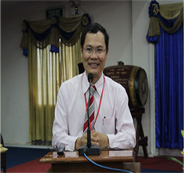
Dear prospective students and visitors,
Welcome to the Faculty of Education!
It is said that the foundation of every state is the education of its youth. I completely agree with this proposition. No matter how intelligent and energetic a leader, or his/her group, is, it is impossible he/she can do everything for his/her nation. It requires that all the citizens be appropriately educated. So, what kind of education is appropriate? John Dewey, a famous American philosopher, said, “Education is not preparation for life; education is life itself.”
The Faculty of Education is envisioned to produce well-rounded graduates who are equipped with broad knowledge, relevant skills, and appropriate attitude needed for a healthy living and a happy life in the fast changing world. Theodore Roosevelt, the 26th President of the United States, stated, “To educate a man in mind and not in morals is to educate a menace to society.” To this end, the Faculty of Education offers multidisciplinary curricula that integrate academic with real-life experiences. The spiral curricula that are learning outcomes-based ensure the students’ readiness for smooth transition from one level of study to another. This type of curricula contains liberal arts courses in the first year aiming at enriching the learners’ general knowledge, functional skills courses in the second year aiming at developing generic skills, pre-major courses in the third year aiming at orienting the learners to the specialization, and major courses in the last year aiming at strengthening the specialized skills.
These well-designed curricula are taught by highly qualified professors from various parts of the world, making PUC the best place for Cambodian students to be exposed to the world Englishes’ speaking environment. Being committed to excellence, the professors work very hard to create a learning environment in which the learners have ample opportunities to explore the truth and construct their knowledge through well-facilitated activities. Furthermore, there are delightful co-curricular activities to link theory and practice, therefore generating praxis (reflective action). We believe that the variety of learning activities both inside and outside the classroom make the learning enjoyable and fruitful.
The teaching pedagogy that we adopt is a blending of progressivism and reconstructionism philosophies. The earlier philosophy could be perfectly explained by a short statement of Aristotle: “We are what we repeatedly do. Excellence, then, is not an act, but a habit,” and the latter could be reflected in the statement of Nobel Prize Laureate Nelson Mandela: “Education is the most powerful weapon which you can use to change the world.” Based on these philosophies, the learners have to be actively engaged in group work to apply the lessons in the real situations.
In addition to the international standard curricula and qualified professors, the Faculty of Education has adequate resources to support the academic programs. Aside from a large library that is full of updated books and learning materials, it has language laboratories where the learners can practice their language, as well as other support services.
Being on par with international standard, PUC has an extensive linkage with hundreds of prestigious universities in the world, which recognize PUC’s quality education, allowing PUC students to transfer their credits easily.
The Faculty of Education’s motto is “Form personality, Enrich knowledge, and Develop skills.” Your bright future begins here at PUC.
Should you have any inquiries, please do not hesitate to contact our staff.
I wish you success in your study, in your career, and in your life.
All the best wishes,
Dr. Sok Uttara
Dean, Faculty of Education
Tel: (855) 12 76 21 22
Email: sokuttara@puc.edu.kh
